Niyar, sing a song
75 years ago, in May 1944, over 200 thousand Tatars were deported from Crimea. It took only 60 hours. The reason was the accusation of cooperation with the German occupation forces during the Great Patriotic War. In the places of deportation only in the first four years, more than 44 thousand people died of hunger and disease. Subsequently, the deportation was declared unlawful, including Russia and Ukraine. However, the eviction of Crimean Tatars, as well as thousands of representatives of other nationalities — Greeks, Bulgarians, Armenians, Germans, Italians and Romanians — forever changed the peninsula, its toponymy and mythology.

Kashif Seitnomanov, born in 1933
“I was born 40 kilometers from Yevpatoria, in the village of Dzhamanak, now Niva in Russian. There were five of us, I was 11. We were given fifteen minutes to pack, everyone thought we were going to be shot. Before that the Germans were shooting the Jews next to us. There was a Jewish village next door to ours — their people came to our village and said: ‘Take our children, so they will live’. We were on the road for 18 days and arrived in Uzbekistan. They brought us to the village and immediately sent us to work in the cotton field. There were no hours of work, we worked from sunrise to sunset. They whipped us if we didn’t want to work. Young children also worked. The brigadier was an Uzbek. He had a whip like for horses. People were dying on the way and when they got there. My father, a war veteran, a bullet did not reach his heart, so he could not work. My mother was in hospital with dysentery, she lost milk, my baby brother died. A lot of relatives died, they could not dig graves in time, they put them into mass graves over each other. Every day there was a talk about the Crimea: we will come back, we will come back. But my father and mother died in Samarkand, they never returned to their homeland. The locals were okay with it. They were hungry too. When the Tatars were allowed to return, many started to move, but no one had enough money to buy a house, so they returned to Uzbekistan. Already in the nineties, after pickets, we were able to take plots of land, we built our houses slowly, and thank God we’re still living”.
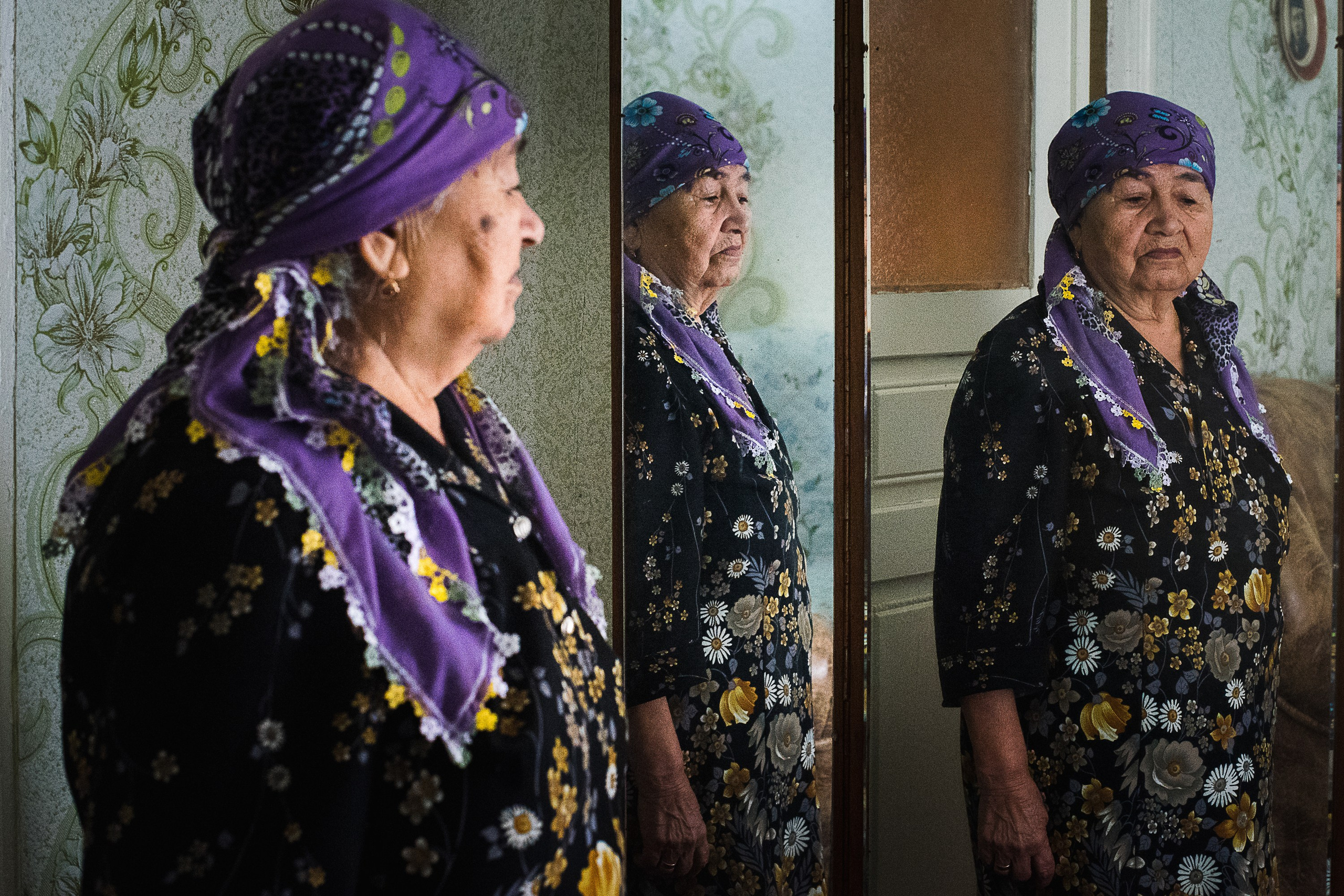
Munire Ablyazova, born in 1936
“We lived in Chokrak village, Chornomorskiy rayon. My mother and four children, and my father was taken away in 37, he was literate, chairman of the collective farm, he supported the local mullah, and it was forbidden. One day a district officer came and said: 'You are invited to a meeting. I never saw my father again. On the night of May 18 Russian soldiers came. They gave us 15 minutes to get ready. There were good soldiers: they helped us to shake out the cotton from the mattress and put there wheat, clothes, and bowls-cups. They brought us to the train station and loaded us into the cattle cars, divided into two floors. The train was stuffy and there was only one window, and I peeked out of it to get some air. My milk teeth fell out at the time, so I threw them out the window and said, 'You’ve got the bone teeth, give me the gold ones. When the train stopped, people would run out of the train, gather brushwood, try to cook something. The train would rumble, everyone grabbed dishes and ran. At one of the stations hot water poured from a locomotive, my mother put me and my little sister under the water and gave us a bath. After 22 days, we reached Uzbekistan, where they scattered us in villages, we knew neither languages nor people. At first they thought we had horns, so they were afraid of us, but we were afraid of them. When Stalin died, the whole town was burying him. We all cried, we all bore wreaths, because our leader was dead, we thought the world had crumbled. In 1965, I came to the Crimea, I visited our village, and the first thing I did was to take some land to my mom, bring it to Uzbekistan. In 1989 we came back to Crimea, they mocked us, didn’t give us a propiska, didn’t allow us to buy a house. People stood outside the City Executive Committee for months, but nothing moved. Then we all came together to the empty field where our houses are now standing, put up tents and lived in them from August to November. When it got cold, we came to the City Executive Committee and lived there for 15 days. They said to us: 'Leave the building, or we will blow it up together with you. The policeman came, picked out four young guys and told us to follow him to negotiate. I jumped up: 'No way! My father left me for good, do you guarantee that these kids will come back? Let’s all go together!” I wrote letters, went to the radio station, told them we were back home, and there was nowhere to live. But we managed to get our way”.
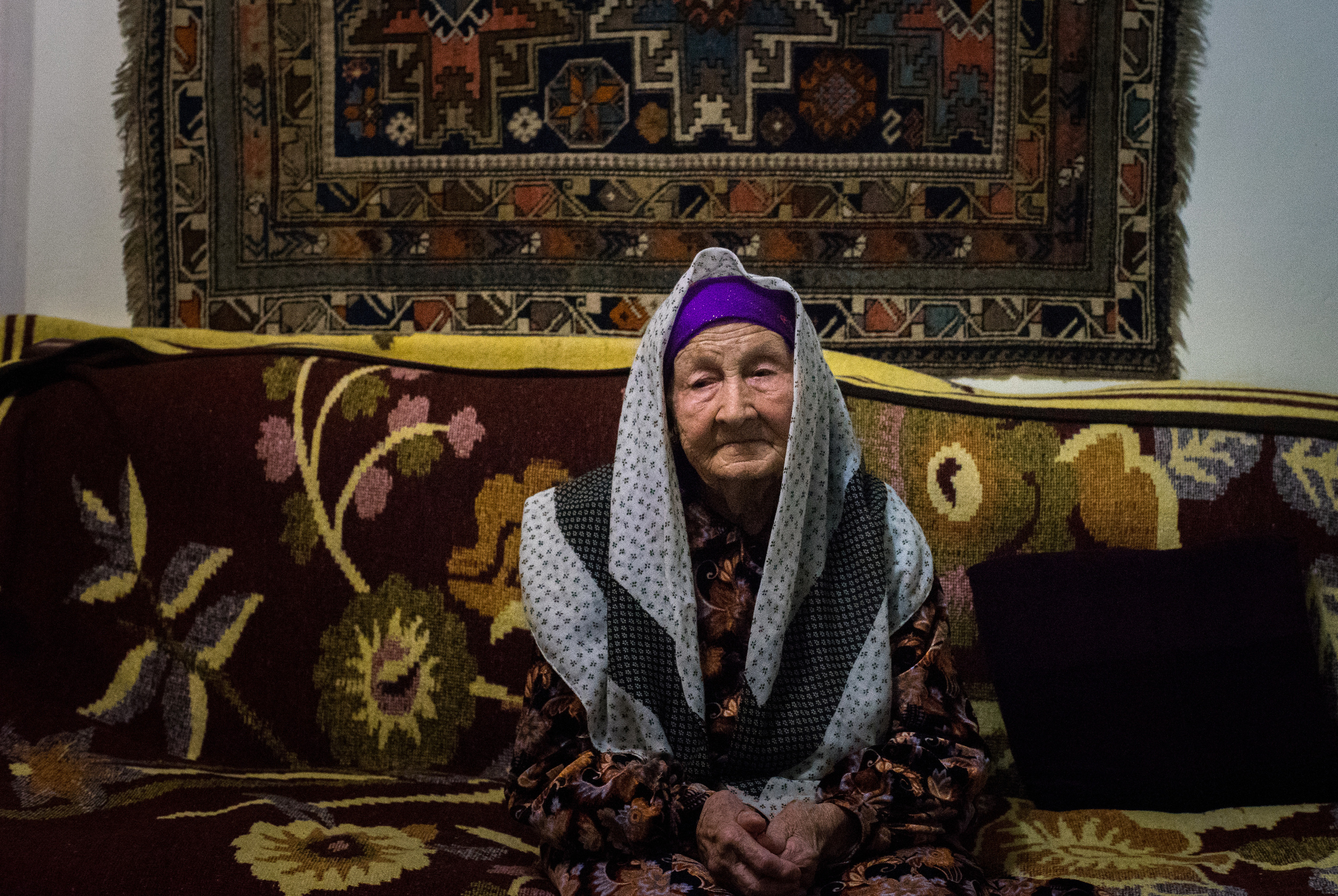
Sidika Mefoeva, born in 1926
“I lived in Yevpatoria. At first they came to us to do a census, saying who survived the war and who didn’t. In fact, they were preparing us for deportation. On May 18 in the morning there was an early knock on the door. They said: 'Pack up, they’re taking you away from here. Mom, Dad, five girls, the youngest was five. They didn’t give us any time, we packed what we could: beds, clothes, flour and oil… All the Tatars were driven out to the square, loaded into cars and brought to the train station. There were four families in our wagon, we shared what we had. Twice on the way we were given some kind of liquid soup, and it was a two-week trip. When we arrived in Samarkand, we were lodged in an empty village. The Uzbeks were told they were bringing terrible people with them, traitors and murderers. They were afraid of us, then they looked at us, we treated them well, so we became friends. They are all Muslims, and the language is a bit similar. We quickly learned Uzbek. The hosts had a cow, they shared: they made kefir and butter, ayran, cottage cheese. They didn’t have anything either: the men had all gone to war, only women, children, and old people. We were given work in the cotton field: we weeded it, worked long hours, bent over. Every Sunday we went to the market, sold our own things: embroidered shawls, clothes, bought food. We went to the commandant’s office every month, the children at school were enumerated. “Crimean Tatars stand up, ” and they counted everyone.In 1992, I came to Crimea, went to see the house where I was born. A woman came out and said, 'What do you want, Grandma? I explained that I had lived here before the deportation, and she said: “That’s not true, I inherited the house from my grandmother, you can buy it if you want. They were settling people from the mainland in our place, they were purposefully erasing our memories. And we, when we came back, stood in pickets 24 hours a day in order to get land in a clear field”.
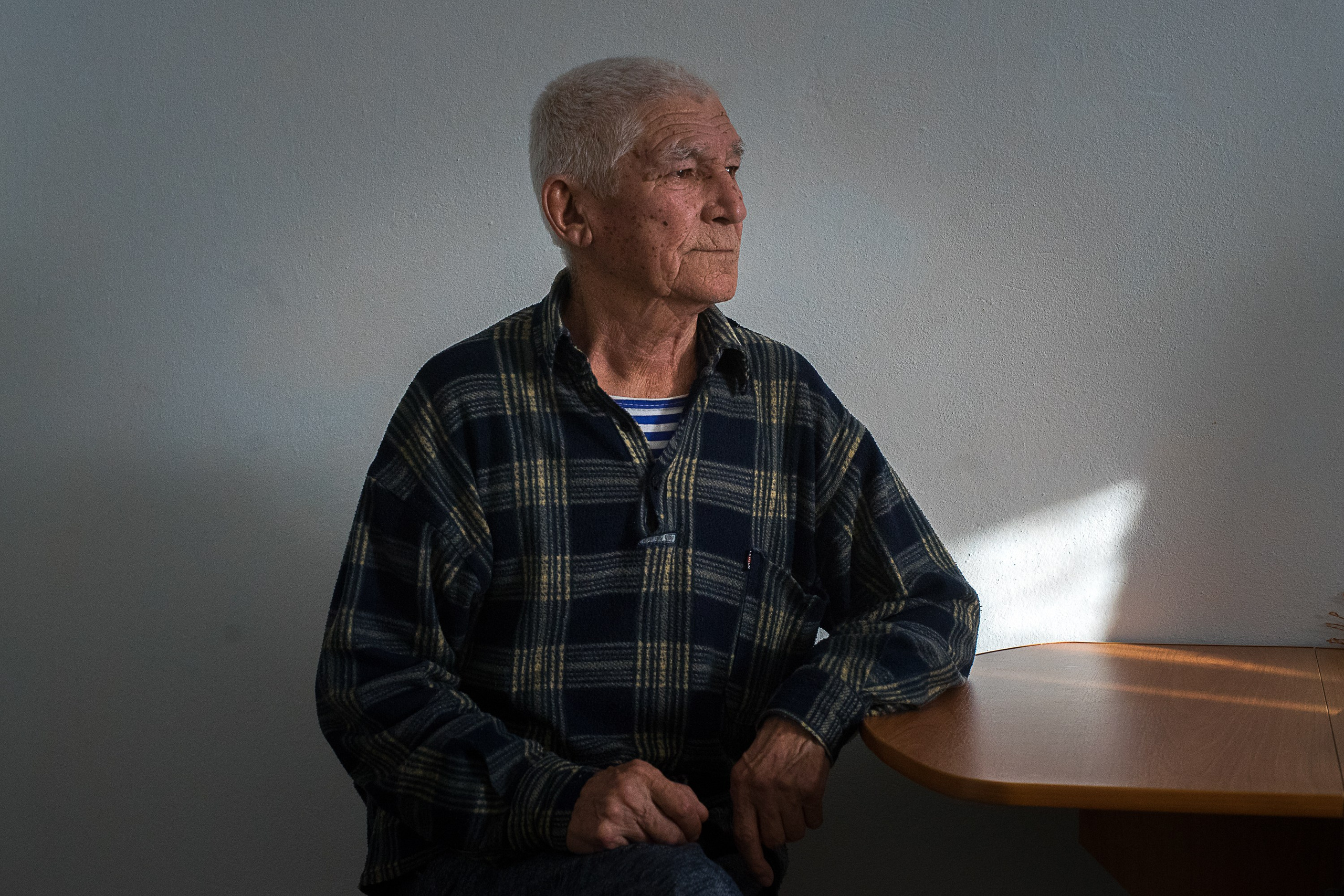
Sait Kurtametov, born in 1941
“We were exiled to Perm (Molotov) Oblast. When they took us away, all the livestock was howling in Crimea. No one to milk a cow, a hungry dog on a chain. I was four years old, so I only began to realize that we were deported when I was in school, when they started calling me a traitor.My father worked at the timber company, my mother was with eight children. Many died at the logging site: accidents, hunger and frostbite. My father died in December '53. We lived in a barrack: bedbugs, cockroaches, lice. Prisoners lived there before us. We were given black rye bread on ration cards. The locals planted potatoes, when the harvest was over we picked frozen potatoes, we were chased for it. After school we went to work at the collective farm, picked rye. We were not allowed to take anything. My cousin’s husband was given three years for a stack of spikelets.Two of my brothers fought in the war, they came back to their homes from the front, and other people lived there already. The front-line soldiers were given 24 hours to leave Crimea”.

Shekure Seytkhalilova, born in 1936
“We lived in a village near Yevpatoria. There was a three-room house, a farm, five children. I was seven and a half when we were deported, the oldest was nine. The adults were crying, saying goodbye to their neighbors, to the land. Mom and Dad were confused, they didn’t know what to take, they only took one big blanket and a palace on the floor. Then they put us on the train, lots of people, not enough air. There were gaps and all the way daddy put me in his arms so I could breathe. On the train we were given camel meat and salted fish soup, but there was no water. Those who died were taken out of the train and not buried, there were jackals at night…We came to Karl Marx collective farm in Uzbekistan. We were given a shed: in one corner — their cow and ram, in the other — our family. Straw was laid out, a blanket on top. Everybody slept under it. Dad died almost at once. Then my little brother, he was two years old. They died of hunger, illness, work, climate. Water was from irrigation canals, dirty, and we needed to drink. Fruit was saved. Each Uzbek had his own melon field. We helped to pick it up, and they let us, the children, take it for our pity. It was very hard in winter. After the harvest, we dug out rotten vegetables from the fields. We milled flour with grass, made cakes. They agreed to any work, for a piece of bread or a handful of flour, just to get by. Gradually they began to settle in, they planted peas, rice, and beans. When the Tatars were returning to Crimea in the 90s, people there were setting us against us, saying that we would slaughter everyone. People were afraid that we would demand back the houses from which we had been evicted. They didn’t hire us at first, but then they realized that we were hard-working people”.

Nedim Dzhemilev, born in 1933
“We lived in the Leninsky District, in Kerch. The soldiers came for us early in the morning. My brother was shot by a German during the war, he was in the hospital, and my mother went to visit him. There was only my grandmother at home, she didn’t speak Russian, so they called the school teacher, and he translated for my grandmother: They put us in trucks and drove us right up to the train, to the freight car. We came to Uzbekistan, the climate was mild there, but my brother was sent to Siberia after his hospitalization. My father came home from the front: the house was closed, no one was there. They didn’t tell him anything, it was classified that we were evicted. He went to Uzbekistan, looked for us, found us a year later. When I was 11, I started working as a shepherd. I was fed by the cattle owners. We lived in a room at the state farm. The hardest thing was hunger. We were given 500 grams of bread a day. When you are full, it’s enough, but when you are always hungry, you eat it all up at once. Our parents were homesick, but we were boys — it made no difference to us. Hunger only made us hungry all the time”.

Zeishan Bekirova, born in 1933
“Before the eviction, we lived in the village of Agach El, now the village of Zavetnoye — all Crimean Tatar toponymy has been changed. My father was shot by the Germans as a partisan. I was 10, my sister 12, and two younger brothers.We were already asleep that day, as three men flew in, shouting something. My mother didn’t understand Russian, grabbed her Koran and started crying. We were pushed out of the house, my sister took a clay pot with melted butter, and a soldier took it away and kicked us in the ass; my sister flew out into the street and fell down. We took nothing with us — except the Koran. They put us in a car and took us to the square, and my mother hugged her two little sons and said: “I was afraid the Germans will shoot us, but here they will kill us. People around were crying, dogs in the village were howling, cows were mooing. But they did not kill us: they brought us to the railway station and loaded us into trains, like herrings in a barrel. A hole was punched in the floor — a toilet. My mother’s sister was travelling with us, her two children, the youngest was nine months old. He died in our arms in a barrack in the Urals. On the way the trains were divided: half of them were sent to Uzbekistan, and we came to the Urals, to Krasnokamsk. Half of us were evacuated to a barrack, the place was swampy. Half a year later our barrack sank, we were evacuated to a neighboring one. My mother got a job at the paper-mill, they gave me something to eat. She did not eat by herself, I used to go to the canteen to get her portion and share it with everybody at home. We barely survived the first winter. A local grandfather took us to the forest, showed us what mushrooms to pick. We could not cook them, we had no utensils — we just threw them on the stove and ate them. In summer we started to pick blueberries, blueberries, cranberries. There was a plant office in the village where we used to deliver berries through the window. Every week we had to go to the commandant’s office to sign, they called us traitors — both old people and children”.
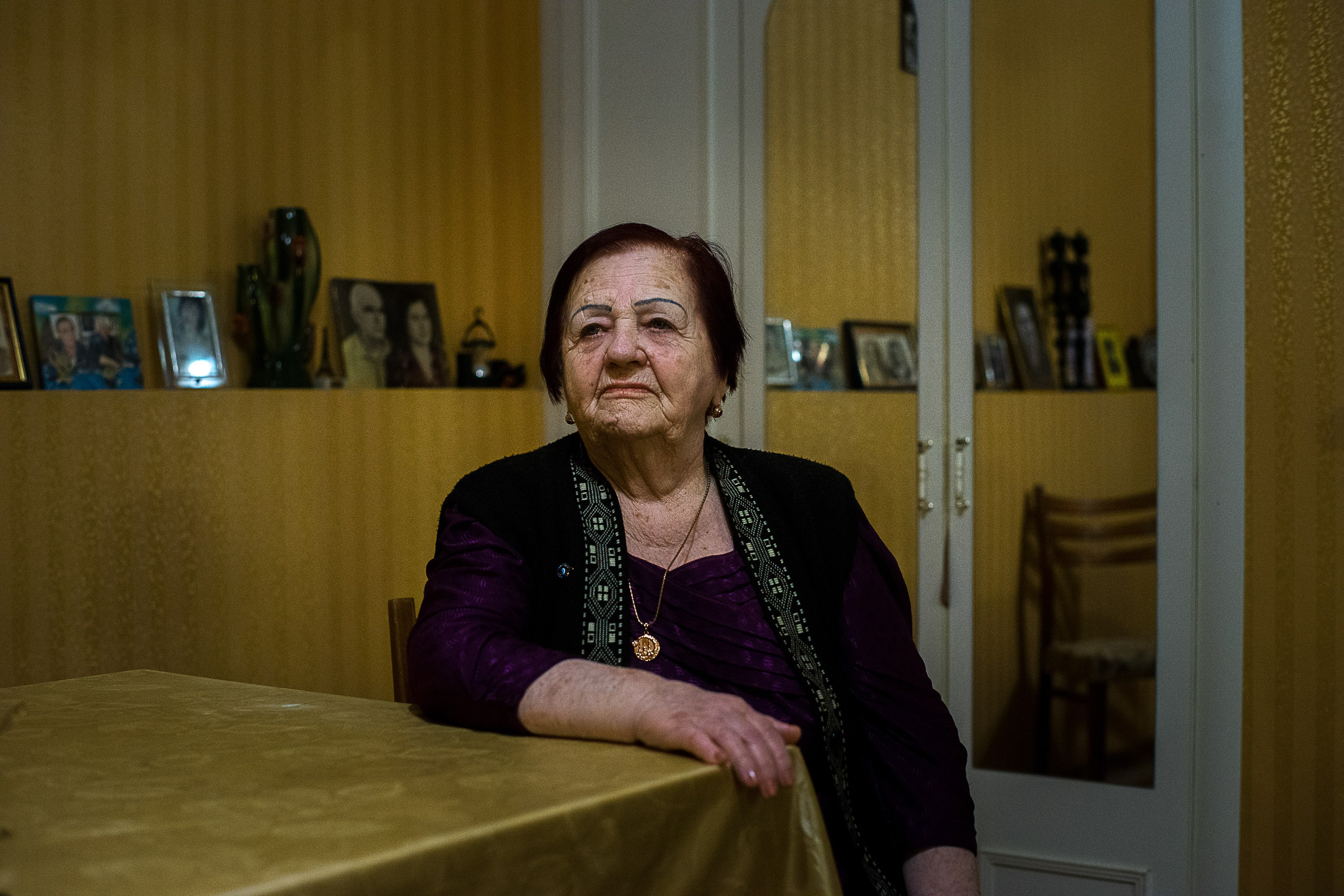
Fetiye Mustafayeva, born in 1929
“On the day of deportation, I was at my girlfriend’s in Simferopol, and our mothers were in the village. At three o’clock in the morning there was suddenly a knock, and I said: 'Sera, the Germans have come back. Then I hear them shouting in Russian: 'Open up! ' The soldier said: Take some crackers, you will need them. We got out and got in the car and headed for the train station. They loaded us into a wagon, there were horses there before, the stench. People were crying, they remembered how the Germans were chasing Jews along the boulevard: women, old people, children, dolls and toys in their hands. There was a young woman in our carriage, she was taken straight from the maternity hospital. She was in a hospital gown, and a baby, wrapped in a blanket. She was cradling him, but he wasn’t even crying. When the soldiers came to check on him, it turned out that he had been dead for three days. She did not show her face, because the corpses were thrown off the train and were not buried. She screamed so much, she lost her mind after that. When they stopped the train to look for the dead we asked for water, and they answered: “Wait, or do you want to be shot? But the commandant came out and said: 'These people will live with you. Remember how you were exiled? Now they have been deported, help them. In '45 I ran away to Sverdlovsk to find my mother. I went to the porch of the NKVD, addressed a man in shoulder straps who was walking by. 'You’re a deserter, ' he said, when he found out where I was from. — All right, have something to eat, then we’ll talk. Gave me cocoa and a cheese sandwich. Then he brought me home and said to his wife: Annushka, look what kind of girl I brought. She washed me, dressed me, put me to bed. This man found my mother in Fergana and sent me to her. My mother cried when she saw me, we didn’t see each other for two and a half years, we talked for three days”.

Niyar Bekirova, born in 1940
“I lived in Bakhchisaray. I remember how they put us in the wagons, our people were sitting and crying in the whole village. I was a vocal girl, and I sang a village song, a joke song, translated into Russian: 'You’ll have a baby with a Romanian. And everyone who was crying started laughing. We drove for over a month, many were sick and dying, they were left on the road, who would bury them? At stops we were occasionally given some sort of bar. We were sleeping on the floor, under one blanket: my brother and I were in the middle, my mother was on my side and my father next to my brother. The adults used to take me especially to the cotton field, because there they would give me a piece of jugar, and we would share it and eat it all day long. Our neighbor was a blind Tatar, but he played the violin so well. Sometimes they would gather to listen to our songs, remember Crimea”.
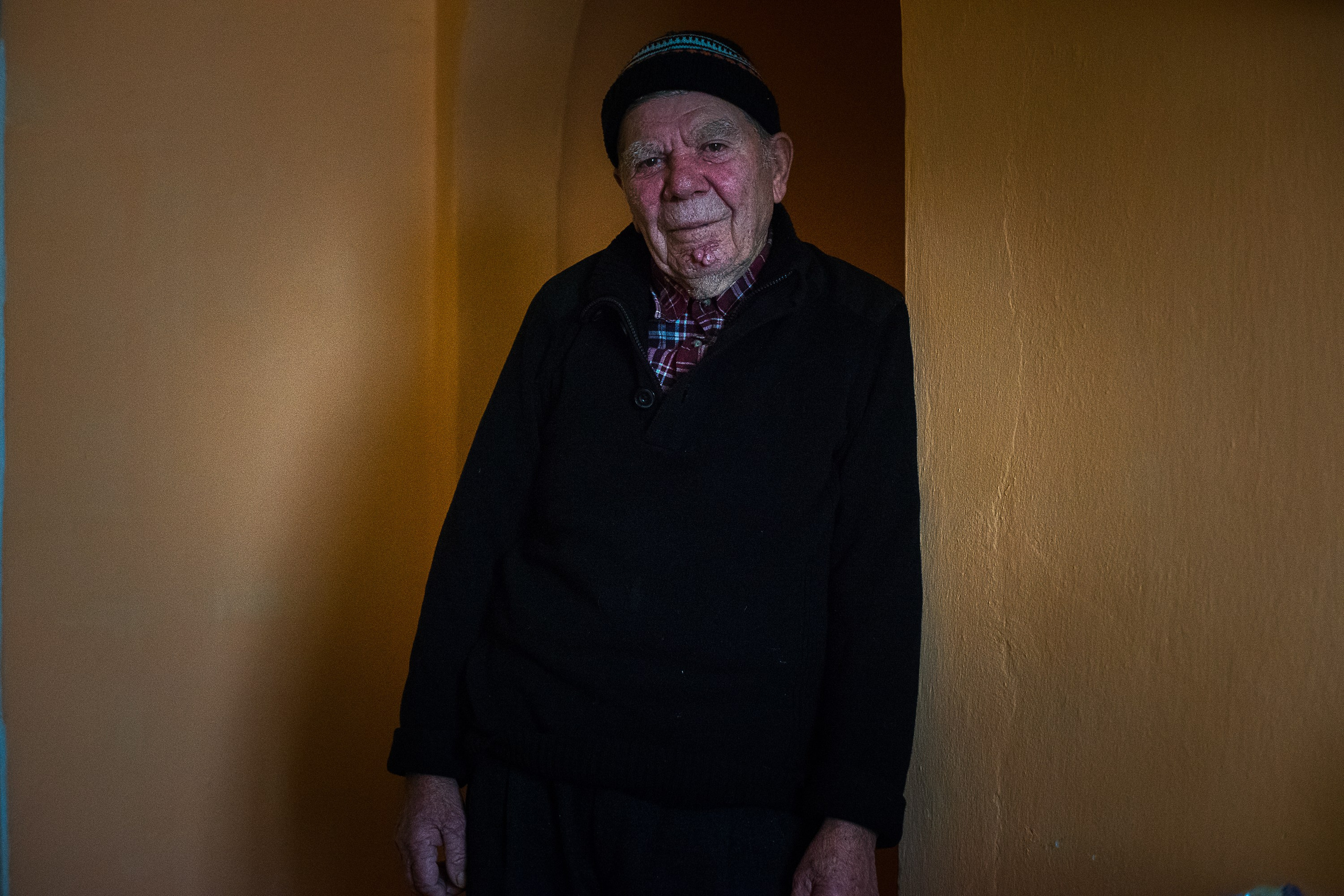
Memet Asanov, born in 1929
“At 10 p.m. they came for us. They said: 'Get dressed, take your food for three days and go out. They brought us not to the train station, but to a field near the railroad; we thought they would shoot us. But we were put on the train. We were on the train for a month. On the way there was no food. We ate what we took with us. We were brought to Sverdlovsk region. Before that the settlement was inhabited by convicts. There were plenty of bedbugs, the houses were wooden. We didn’t die on the way, but when we reached there, almost half of the half died.The norm of bread for non-working adults was 200 grams. Working people were given 500 grams, children 400 grams. Bread was mixed with moss, to make it bigger. We got used to hunger: you would not eat for two days and it was as if it was necessary. In summer it was easier: we boiled nettles, I found a pin, made a fishing rod. We worked at the lumberyard in winter, and then we fused it in spring. My father worked for a month and then fell ill. He died in January. Me and my brother had been digging his grave for three days, the ground was frozen. We made bonfires, dug out the thawed earth and gradually moved forward. And the ground froze up, we had to cover it with snow and in spring we already buried it with earth. In '46, my mother died, my younger sister died in '48, she was eight years old. I went back to the Crimea in '90, went to see our house. So much time had passed, and the outside of the house had not even been whitewashed since then. In '56, we were rehabilitated, but everyone signed that he had no right to his property. When I came here in '90, they wouldn’t give us a residence permit for a long time; we lived here in a bare field”.